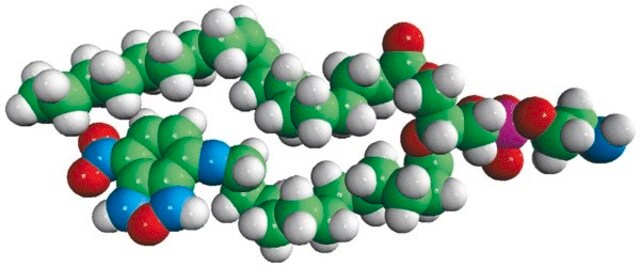850373P
Avanti
24:0 PC
1,2-dilignoceroyl-sn-glycero-3-phosphocholine, powder
Synonym(s):
1,2-ditetracosanoyl-sn-glycero-3-phosphocholine; PC(24:0/24:0) ; 110929
About This Item
Recommended Products
Assay
>99% (TLC)
form
powder
packaging
pkg of 1 × 200 mg (850373P-200mg)
pkg of 1 × 25 mg (850373P-25mg)
manufacturer/tradename
Avanti Research™ - A Croda Brand 850373P
lipid type
cardiolipins
phospholipids
shipped in
dry ice
storage temp.
−20°C
SMILES string
[H][C@@](COP([O-])(OCC[N+](C)(C)C)=O)(OC(CCCCCCCCCCCCCCCCCCCCCCC)=O)COC(CCCCCCCCCCCCCCCCCCCCCCC)=O
General description
Application
- in both short-chain micelles and longer-chain oriented multilayers and in Langmuir monolayers for structural studies of the human immunodeficiency virus 1 (HIV-1) accessory protein
- to compare cohesion/to study the effects of lipid cohesion on the thermally induced revaporization and dissolution of microbubble condensed droplets (MCDs)
- to study its effects on non-amyloidogenic processing of amyloid precursor protein (APP) and to study the effects of the its carbon chain length on α-secretase activity
Biochem/physiol Actions
Packaging
Legal Information
Storage Class Code
11 - Combustible Solids
Certificates of Analysis (COA)
Search for Certificates of Analysis (COA) by entering the products Lot/Batch Number. Lot and Batch Numbers can be found on a product’s label following the words ‘Lot’ or ‘Batch’.
Already Own This Product?
Find documentation for the products that you have recently purchased in the Document Library.
Our team of scientists has experience in all areas of research including Life Science, Material Science, Chemical Synthesis, Chromatography, Analytical and many others.
Contact Technical Service








